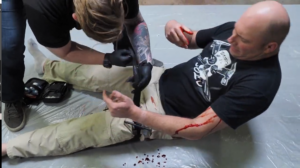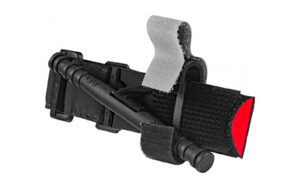Tourniquets! 2 CRITICAL Reasons Why Cops Need ‘Em

Law Enforcement officers tasked with the duty of maintaining public safety, often face dangerous and unpredictable situations daily.
While their primary focus is to protect and serve, they find themselves in settings where the use of lethal force is necessary to uphold the law and protect the lives of the public.
Why Cops NEED Tourniquets
In these tense encounters, injuries absolutely will occur, and it's essential that police officers are equipped with the tools to provide immediate medical assistance in the form of bleeding control.
One such tool that is increasingly recognized as a critical asset for law enforcement is the tourniquet.

Police Officers apply tourniquets to the victim of a recent shark attack.
Tourniquets (TQs), like the CAT from North American Rescue, are crucial for police officers for two very important reasons
- They can save lives in situations where severe bleeding is occurring. Whether an officer or a suspect sustains a gunshot wound, a stabbing, car accident or any other type of trauma, rapid blood loss can become life-threatening within as little as 2.5 minutes.
- When properly applied, TQs can effectively control this bleeding, preventing a person from succumbing to shock or exsanguination until EMS arrives to take over.
In high-stress situations, police officers face many challenges in administering first aid. The simplicity and ease of use of tourniquets are critical in these chaotic situations. TQs require only a small amount of training to be used effectively, and can be applied quickly, making them invaluable tools for officers and their fellow officers.

Combat Application Tourniquet (CAT)
The key to success here is frequent, quality training designed for the officer on the streets. Departments need to prioritize training for their officers and provide them with the best medical gear possible so they can go home to their families at night, and serve the people more efficiently.
Tourniquets are versatile tools that can be used in a variety of medical and tactical scenarios. And, they aren’t limited to injuries resulting from violent encounters.
Cops often find themselves in situations where accident victims require immediate assistance. Car accidents, industrial accidents, natural disasters, and home repair injuries are just a few examples of incidents where a trauma kit can prove to be life-saving.
TQs have evolved significantly in terms of design and safety, minimizing the risk of complications associated with their use. Modern tourniquets are engineered to control bleeding effectively while causing minimal tissue damage or nerve injury.
If the casualty is transported to the hospital within 2 hours, there is little to no risk of nerve or tissue damage resulting from application.
Doc’s Wrap Up
Including TQs as standard equipment for police officers is absolute requirement for all police departments. Officers are responsible for providing timely and effective care and promoting the preservation of life in high-stress and high-risk situations and they need the gear to do that.
LE agencies must prioritize equipping their officers with gear, and most importantly of all, providing training in their proper use, and emphasizing their importance in the line of duty.
All officers should be trained EMTs. But unfortunately, at the time of writing this article, that is not the case. It then comes down to department to source quality training for their officers. But often, when things need to get cut from the budget, its medical training and supplies that get left out.
Mountain Man Medical offers a 1st responder discount to all police officers and bulk discounts on orders of multiple kits. For officers looking for free bleeding control training, check out our course below.
If you would like to learn how to properly apply a TQ to save someone’s life, click the link below for our FREE online trauma course.
